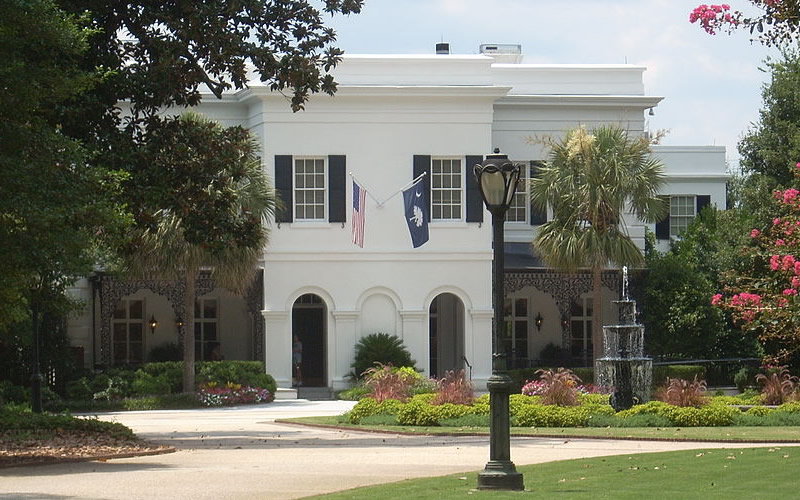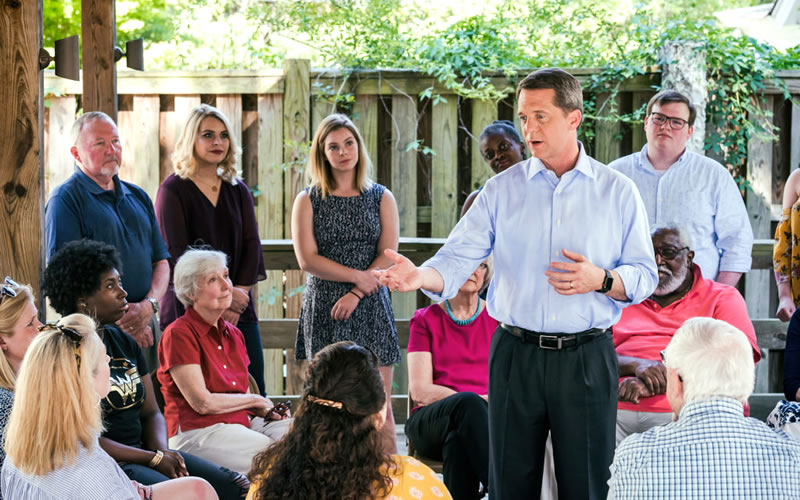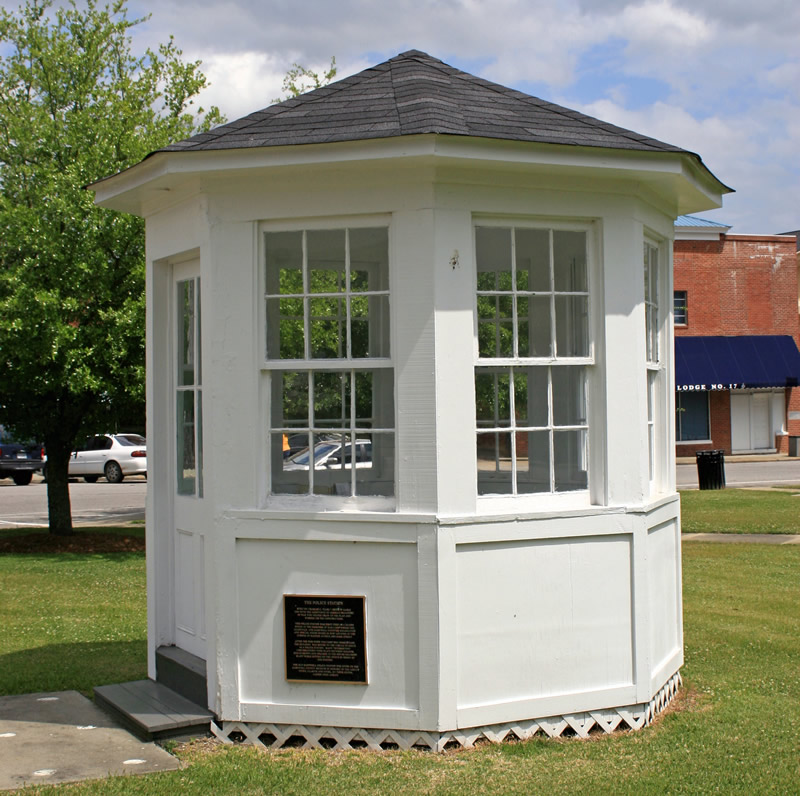NEWS: S.C. farmers aren’t water boogeymen, advocate says
BRIEFS: On Medicaid, student debt, conservation and a Senate opening
COMMENTARY, Brack: Governor’s races pit establishment versus grenade-throwers
SPOTLIGHT: AT&T
MY TURN, Smith: Let’s move S.C. forward for everyone
FEEDBACK: No on Planned Parenthood
MYSTERY PHOTO: A gazebo or maybe something else?
S.C. ENCYCLOPEDIA: South Carolina’s governors
NEWS
NEWS: S.C. farmers aren’t water boogeymen, advocate says

By Lindsay Street, Statehouse correspondent | A question over how water is used for crop irrigation in South Carolina is on hold — for now — but an agriculture advocate says family farmers are being inundated with misperceptions that they’re doing something wrong with a plentiful natural resource.
As S.C. conservation groups are preparing for another challenge to a state law that allows farms to withdraw massive amounts of water from rivers, farmers are ramping up a public relations battle to showcase their legacy as real conservation stewards.
“(The media have) created this nameless faceless entity and have lumped these family farms into this category of ‘mega-farms,’” said Stephanie Sox, director of promotion and education at the South Carolina Farm Bureau. “(Our farmers) are actual real people. It’s not robots; it’s not a factory.”
The farms have been called “mega-farms” in recent stories, but Sox says they are really family farms. Some families are small and some families are big, she says.
Background on the water issue
In 2010, the state enacted a surface water law that required any entity siphoning 3 million gallons per month from state rivers to obtain permits. Those permits required the entities such as farms to show that withdrawals were used wisely and would not impact neighbors. However, agriculture permit holders only need to report how much water they would need and how much they use.
Last year, the highest court in South Carolina said challengers to the law have not proven any environmental damages as a result of the law. Last month, the Supreme Court upheld its decision.
“It means that they [farmers] are still being recognized as an essential user of water and the Supreme Court realizes they are being judicious with their use of water,” Sox said.
Perspective on water volume
In 2016, the amount of surface water used for irrigation in South Carolina accounted for 1.6 billion gallons of water, according to state records. To get a perspective of how much water flows in South Carolina, the Broad River has a flow of more than 500,000 gallons per minute. Translated, that means that all of the surface water used in irrigation in 2016 flows in the Broad River in little more than three minutes.
 Sox said 3 million gallons of water is equivalent to a 5-acre strawberry field’s required water for one month. But that strawberry farmer may not need surface water at all. If the state is drought-free, the farmer may have enough water for his or her field. The farmer may also use groundwater. Irrigation with groundwater used about 37 billion gallons of water in 2016. However, in times of need — like a drought — farmers may need to turn to surface water, Sox said.
Sox said 3 million gallons of water is equivalent to a 5-acre strawberry field’s required water for one month. But that strawberry farmer may not need surface water at all. If the state is drought-free, the farmer may have enough water for his or her field. The farmer may also use groundwater. Irrigation with groundwater used about 37 billion gallons of water in 2016. However, in times of need — like a drought — farmers may need to turn to surface water, Sox said.
It’s times of drought that worry conservationists when it comes to surface water.
“When we are in a time of drought that’s when our surface waters are under the most strain and that’s when farmers need to water their crops the most,” said Amy Armstrong, executive director of South Carolina Environmental Law Project (SCELP).
To better understand how much surface water is being used in agriculture, Clemson University is conducting a survey this year.
Not about the farmers, attorney says
 SCELP represented plaintiffs in the water withdrawal lawsuit against state Department of Health and Environmental Control. The organization says it’s not about the farmers, but about applying the same permit requirements regardless of industry type.
SCELP represented plaintiffs in the water withdrawal lawsuit against state Department of Health and Environmental Control. The organization says it’s not about the farmers, but about applying the same permit requirements regardless of industry type.
“All we want is for farmers to have to go through the same permitting process that an industrial user has to go through, that a municipality has to go through,” Armstrong said.
She said the lawsuit isn’t a tool to blame farmers but a way to address changing state law and treating farmers like any other user.
Sox said it comes down to no evidence that the current permitting process is harmful.
“We have said from the very beginning that if the science shows agriculture is, in fact, draining ground and surface water than we obviously would support measures to prevent that from happening because we recognize water is an essential resource. But, right now, the science does not support that position,” Sox said.
Sox said South Carolina farmers have a vested interest in not over-using water.
“They are being very responsible of our natural resources,” she said. “Farmers don’t use water unless it’s absolutely necessary … The natural resources is a farm’s most valuable resources. It is essential for a farm’s sustainability to have those things. They have to take care of their most vital resource in order to preserve their farm and business.”
Armstrong countered that farm responsibility shouldn’t be on the honor system.
“Why are we treating farmers different?” she asked.
SCELP and its clients are regrouping for a new challenge in the meantime. But Armstrong did not say what that new challenge to the law would look like — only that decisions would be made soon.
“The question is not resolved,” Armstrong said. “(The court) certainly left the door open”
- Have a comment? Send to: feedback@statehousereport.com
NEWS BRIEFS
BRIEFS: On Medicaid, student debt, conservation and a Senate opening
By Lindsay Street, Statehouse correspondent | Work requirements for Medicaid beneficiaries could cause some of the state’s poorest parents to lose health coverage, according to a new analysis by the Georgetown University Center for Children and Families and South Carolina Appleseed Legal Justice Center.
![]() The state is seeking a waiver from the U.S. Department on Health and Human Service’s Centers on Medicare & Medicaid Services to enact the requirements.
The state is seeking a waiver from the U.S. Department on Health and Human Service’s Centers on Medicare & Medicaid Services to enact the requirements.
The analysis said that among the 180,000 beneficiaries targeted by the state work-requirements proposal, 85 percent are mothers and 46 percent are not in the workforce. Meanwhile, 22 percent describe themselves as unemployed.
The analysis also warned the waiver would worsen economic prospects for South Carolina’s most fragile families. There will be a 30-day public comment period after the state submits for the waiver, which could be as early as this summer.
In related news:
Health scorecards. The Centers for Medicare & Medicaid Services released its inaugural Medicaid and CHIP scorecards. Some comparisons between states are apples and oranges since Medicaid operates differently in every state, but the scorecards do show South Carolina has more than 1 million people enrolled in either Medicaid or CHIP. This is an increase of more than 100,000 people from five years ago.
States voluntarily reported on 21 health care quality measures. South Carolina provided information for 18 of them. Here’s where South Carolina gets high marks:
- Percentage of children ages 7 to 11 with a primary care practitioner’s visit in the past two years: 87.7 percent;
- Percentage of children ages 1 to 2 with a primary care practitioner’s visit in the past year: 94.1 percent;
- Percentage of adults ages 18 to 64 who received at least 180 days of ambulatory medication therapy and annual monitoring: 85.5 percent.
Here’s where South Carolina gets low marks:
- Percentage of female adolescents receiving three human papillomavirus vaccine doses by their 13th birthday: 6.3 percent;
- Percentage of children ages 12 to 21 with at least one well-care visit: 32.7 percent;
- Percentage children under the age of 3 screened for risk of developmental, behavioral, and social delays: 33.3 percent; and,
- Percentage of women ages 50 to 64 who had a mammogram to screen for breast cancer: 23.0 percent.
- View the scorecard here.
Conservation scorecard. The Conservation Voters of South Carolina released its 2017-2018 Conservation Scorecard, the primary yardstick for evaluating the conservation records of every member of the S.C. Legislature. Scores for the 2017-2018 session averaged 59 percent in the House and 65 percent in the Senate.
Student debt. If you want a higher score for South Carolina, you only have to look to student loan debt. According to a new study by career site Zippia, South Carolina is first in student loan debt. Graduates here usually leave school with an average median debt of $26,535.
Senate seat. S.C. Sen. John Courson, R-Columbia, resigned his seat this week and pleaded guilty to willful misconduct in the ongoing corruption probe. This triggers a special election for the Senate seat\, and also fuels speculation that the corruption probe is going to net some more folks. Here is speculation about who may run for Courson’s seat.
BRACK: Governor’s races pit establishment versus grenade-throwers

By Andy Brack, editor and publisher | Don’t look for too many surprises Tuesday in what’s been a pretty lame set of gubernatorial primaries.
 Unless something surprising happens before the June 12 Republican and Democratic primaries, incumbent Gov. Henry McMaster will lead four challengers and be forced into a runoff while Democratic state Rep. James Smith of Columbia may just muster enough votes to win the party’s nomination outright.
Unless something surprising happens before the June 12 Republican and Democratic primaries, incumbent Gov. Henry McMaster will lead four challengers and be forced into a runoff while Democratic state Rep. James Smith of Columbia may just muster enough votes to win the party’s nomination outright.
This wouldn’t necessarily be a bad result. Why? Because in the long term, state residents would become the ultimate victors.
McMaster and Smith are seasoned leaders who know how to get things done across the aisle. In short, they’re part of the establishment, unlike other candidates who are pumping hundreds of thousands to millions of dollars into efforts as they run against the legislature to try to win the state’s top elected position.
The problem with continuously launching verbal grenades against the “corruption” and good-old-boys of Columbia might sound good now to voters, but it doesn’t work well after an election for anyone who wants to get things done. In a legislatively-controlled state. Do you really think state senators and representatives are going to open their arms to a new governor who has spent months talking trash about them?
Two recent anti-legislative governors provide more than enough examples. During eight years of office, former Gov. Mark “No” Sanford tried to cut state government time and again. Throughout his tenure, he nixed ideas of investing in infrastructure, such as maintaining college campuses. Since 2002, the state hasn’t had a bond bill – even though cheap interest rates and a good credit score make it fiscally sound to borrow, make improvements now and pay pack over time. Meanwhile, state colleges and universities have identified $2.5 billion in deferred maintenance and infrastructure needs.
Former Gov. Nikki “No Squared” Haley early approached state government in a Sanfordian manner, saying no time after time to improving state roads by boosting the gas tax – even though polls showed an overwhelming number of South Carolinians would pay more at the pump to fix potholes and smooth congestion. Boosted highway coffers didn’t come until Haley went to New York to serve as the nation’s ambassador to the United Nations.
![]() In the Republican primary, McMaster and former Lt. Gov. Yancey McGill of Kingstree represent the establishment. Catherine “Buzzkill” Templeton of Mount Pleasant and Greenville businessman John Warren, who has put millions of his own money into the race, are so blinded by rooting out corruption that the rest of their campaign rhetoric – the stuff about making government work – is thin, at best. McGill, like current Lt. Gov. Kevin Bryant of Anderson (who hops back and forth between the establishment and renegades) are at the bottom of polls. Prediction a week out: McMaster will be in a runoff with
In the Republican primary, McMaster and former Lt. Gov. Yancey McGill of Kingstree represent the establishment. Catherine “Buzzkill” Templeton of Mount Pleasant and Greenville businessman John Warren, who has put millions of his own money into the race, are so blinded by rooting out corruption that the rest of their campaign rhetoric – the stuff about making government work – is thin, at best. McGill, like current Lt. Gov. Kevin Bryant of Anderson (who hops back and forth between the establishment and renegades) are at the bottom of polls. Prediction a week out: McMaster will be in a runoff with ![]() Warren.
Warren.
On the Democratic side, Smith faces Florence tax lawyer Marguerite Willis and Charleston consultant Phil Noble. Smith, long considered the frontrunner, has served two decades in the S.C. House of Representatives and has respect among Democratic and Republican state lawmakers. Willis, who wants the state to deal with endemic issues like poverty, talks about ending the old way of doing things. Noble, who doesn’t have enough money to advertise on TV, blasts “plantation politics” and the gun culture as South Carolina’s version of Bernie Sanders. Smith, not the most charismatic candidate on the stump, has a seasoned team with an organized playbook and big endorsements that might get them over the hump to win the primary without a runoff. It will be close. Otherwise, he’ll face Willis on June 26 in a primary runoff.
South Carolina needs to get off the bottom of all sorts of lists where government can make a difference. It needs to improve access to health care, pay teachers more, invest in higher education and roads, and deal with energy and natural resources in new ways. What it doesn’t need is another leader at the top who blames the legislature for all wrongs – even though state lawmakers have a lot of the blame to shoulder.
South Carolinians need to work proactively for a better future, not be mired in finger pointing and naysaying that gets us nowhere as other states move forward.
- Have a comment? Send to: feedback@statehousereport.com.
SPOTLIGHT
SPOTLIGHT: AT&T
 The public spiritedness of our underwriters allows us to bring Statehouse Report to you at no cost. Today’s featured underwriter is AT&T Inc.
The public spiritedness of our underwriters allows us to bring Statehouse Report to you at no cost. Today’s featured underwriter is AT&T Inc.
AT&T Inc. (NYSE:T) helps millions around the globe connect with leading entertainment, mobile, high speed Internet and voice services. We’re the world’s largest provider of pay TV. We have TV customers in the U.S. and 11 Latin American countries. We offer the best global coverage of any U.S. wireless provider*. And we help businesses worldwide serve their customers better with our mobility and highly secure cloud solutions.
- Additional information about AT&T products and services is available at http://about.com.
- Follow our news on Twitter at @ATT, on Facebook at http://www.facebook.com/attand YouTube at http://www.youtube.com/att.
* Global coverage claim based on offering discounted voice and data roaming; LTE roaming; voice roaming; and world-capable smartphone and tablets in more countries than any other U.S. based carrier. International service required. Coverage not available in all areas. Coverage may vary per country and be limited/restricted in some countries.
SMITH: Let’s move S.C. forward for everyone

By S.C. Rep. James Smith, special to Statehouse Report | South Carolina is a state with enormous potential. From the people who live here to our unparalleled natural heritage, the Palmetto State is blessed abundantly. And yet, our state has been stunted in its economic growth and progress because political leaders have been too willing to accept the status quo.
![]() I have served the people of House District 72 for 22 years and I have been honored by their confidence and trust in me. Yet I have watched, year after year, as partisan bickering and posturing by the Republican Party has halted real advancement.
I have served the people of House District 72 for 22 years and I have been honored by their confidence and trust in me. Yet I have watched, year after year, as partisan bickering and posturing by the Republican Party has halted real advancement.
A recent report revealed that 194,000 South Carolinians, up from 125,000, are without access to health care because the last two Republican governors — for political reasons — refused to accept the federal health care funds that would have provided coverage for our citizens.
The impact of this decision has been devastating. As I have campaigned around the state, I have met citizens in every county who have been directly affected by this decision. From the elderly couple who has had to decide between paying their mortgage or buying their medicine to the parents who have to drive their child across two counties to access urgent care due to yet another rural hospital closing.
These outcomes are unacceptable. Your ability to access quality health care should not be dependent on how much you make or where you live, and yet for many of our neighbors, that is their reality. Healthcare should never be a partisan issue. For those who are without it, I can tell you that it’s anything but political. It is a matter of life or death.
If we are serious about moving South Carolina forward, we should be working to move South Carolina forward for everyone. We should not accept the fact that anyone working full-time should live in poverty.

At the end of the day – in order to fulfill our greatest potential and build an economy that works for everyone – we must provide access to high-quality education and workforce development opportunities. We must enact education reforms that modernize our public education system and elevate the status, role and importance of our teachers. For too long, we have been failing the children of this state, but together I know that we can change that. I look around this state and I see the potential in every student. From the students who organized the March For Our Lives rallies to the students in teacher cadet programs, we need to prioritize our future by modernizing our education system and focusing on the students themselves, rather than their test scores.
I don’t claim that a Democratic governor can fix things overnight, but I do think our party is focusing on the right issues that affect real people’s lives. And I don’t claim to be the candidate with all the answers, but I think my years of experience have taught me how to ask the right questions and listen for answers with open ears and an open mind.
I am running for governor because I believe in the greatness of our state, and I am tired of seeing too many South Carolinians struggle. We can and must do more to meet the needs of the people in our state. We must focus on policies that build healthy families and strong communities in urban and rural areas. As South Carolinians, we must ensure our state moves forward – together. That is why I ask for your vote in the Democratic Primary.
Columbia attorney James Smith is a member of the S.C. House of Representatives who is seeking the Democratic nomination for governor. More: JamesSmith.com.
IN THEIR OWN WORDS: In recent weeks, Statehouse Report has offered opinion pieces by gubernatorial candidates with primary challengers. Five Republicans and three Democratic candidates for governor submitted messages they want to share with voters.
Recent candidate contributors
- GOP, McGill: South Carolina is worth fighting for(April 19)
- GOP, Templeton: “The called me the ‘Buzzsaw’”(May 3)
- GOP, Warren: “We deserve better from our leaders” (May 10)
- DEM, Willis: People run for office for lots of reasons(May 16)
- DEM, Noble: “It is never too late to do what we know is right” (May 21)
- GOP, McMaster: Fighting to achieve our full potential (May 25)
- GOP, Bryant: C. still awaits true ethic reform (May 31)
- Have a comment? Send it to: feedback@statehousereport.com.
FEEDBACK
FEEDBACK: No on Planned Parenthood
To the editor:
I am a South Carolina resident and I wish to add my comment about the governor’s order to STOP any and all state funding to Planned Parenthood. I am totally in favor of this — I DO NOT want any of my tax dollars to go to Planned Parenthood.
— Jane Kenny, Bluffton, S.C.
Send us your thoughts. We love hearing from our readers and encourage you to share your opinions. But you’ve got to provide us with contact information so we can verify your letters. Letters to the editor are published weekly. We reserve the right to edit for length and clarity. Comments are limited to 250 words or less. Please include your name and contact information.
- Send your letters or comments to:feedback@statehousereport.com
MYSTERY PHOTO
MYSTERY PHOTO: A gazebo or maybe something else?
This week’s mystery surely looks like a gazebo, but it’s probably something else. What and where? Send your best guess – plus your name and hometown – to feedback@statehousereport.com. In the subject line, write: “Mystery Photo guess.” (If you don’t include your contact information, we can’t give you credit!)
Our previous Mystery Photo

Avid reader and photographer Bill Segars of Hartsville snapped the photo of the June 1 mystery, which is Temple Sinai in Sumter. It’s been in the news recently because its social hall and educational center have been conveted into a new Jewish History Center. (Read more.)
Congratulations to those who identified the building correctly: former state Sen. Phil Leventis, who lives in Sumter; George Graf of Palmyra, Va.; Faith Line of Anderson; and Jay Altman of Columbia.
Leventis told Statehouse Report that he attended the center’s opening ceremony on June 2: “The group was addressed by my friend Roger Ackerman, who spoke about our friend Abe Stern who survived the Nazi concentration camps and used to have the tattoo to prove it.
“Abe once told me that he had the tattoo removed by his doctor here in Sumter. When his doctor saw it, he inquired what it was. Abe told him. The doctor asked if he wanted it removed to which Abe responded it never did anything for him. So it was gone. The only symbol it represented to him was terrible memories. It was no badge of honor, just a reminder of horror.”
Graf provided additional context: “Temple Sinai, a Reform Jewish Congregation located on Church Street, has entered into a new partnership with the Sumter County Museum. Over the years, dwindling numbers in the temple’s congregation have led its members to consider long-term planning for the building itself, if the day comes when the congregation is no longer viable.
“In this new partnership, the congregation will still use the temple sanctuary to conduct Friday night and holiday services, but the museum will use the adjoining social hall to create a permanent exhibit about Jewish history in South Carolina and Sumter. The museum will also include a large section devoted to the Holocaust and Sumter’s ties to the Holocaust.
“The first Jewish citizens of Sumter arrived from Charleston around 1815.Two early organizations preceded the formation of a Jewish congregation in Sumter. The Hebrew Cemetery Society was formed and land purchased for a cemetery in 1874. The Sumter Hebrew Benevolent Society was organized by 1881. Shortly thereafter, the two groups merged and in 1885, the group formally became known as The Sumter Society of Israelites, the official name of present-day Congregation Sinai. Although regular Sabbath worship and Sunday school classes were held in the late 1800s, the first official synagogue, a wooden structure, was not built until the first decade of the 1900s. It unfortunately burned and was replaced with the present brick building in 1913. The temple’s construction is unusual, with its Moorish design and large, uniquely-crafted stained glass windows. The synagogue was established as and has always been a Reform Jewish congregation.”
Send us a mystery: If you have a photo that you believe will stump readers, send it along (but make sure to tell us what it is because it may stump us too!) Send to: feedback@statehousereport.com and mark it as a photo submission. Thanks.
S.C. ENCYCLOPEDIA
HISTORY: South Carolina’s governors

S.C. Encyclopedia | The governorship of South Carolina is a dynamic office that has changed frequently, and sometimes dramatically, during the past three hundred years. As the biographies of individual governors show, each has faced common as well as unique challenges, often with mixed results.
During the proprietary period (1670–1719), South Carolina governors were appointed by the Lord Proprietors. The next governors were appointed by the British crown from 1719 to 1776. The General Assembly elected governors from 1776 through 1865. From June 30, 1865, through November 29, 1865, the governor was appointed by the president of the United States. Since the end of 1865, governors have been elected by statewide popular vote.
Governors appointed by the proprietors worked with a council that was initially composed of separate groups of proprietors’ representatives, representatives chosen by local officials, and representatives of the people generally. By 1691 the council was reduced to a two-house legislature that, over time, became dominated by the lower house, the Commons House of Assembly. After 1689 the proprietors appointed a governor for Carolina in Charleston and another for the section “north and east of Cape Fear.” Beginning in 1710, a separate governor was continually appointed for North Carolina. An additional governor was appointed in 1682 for a new settlement of Scots, called Stuart’s Town, near today’s Beaufort until it was destroyed by the Spanish in 1686.
The first governors of South Carolina after American independence held the title “President of State.” From adoption of the state’s third constitution in 1790 until 1865, governors were elected by the General Assembly to two-year terms. Until 1812 all governors came from Charleston, the economic and political center of the state. The first governor from the upcountry, Andrew Pickens, was elected in 1816. Nevertheless, due to the under representation of the upcountry in the General Assembly, Charleston and the Lowcountry remained the center of political, social, and economic power in South Carolina well into the nineteenth century.
Under the 1865 constitution, the governor was popularly elected for the first time. The governor’s tenure was for a four-year term, but the term was reduced to two years by the 1868 constitution. An incumbent could run for reelection once. These arrangements remained in place until the 1895 constitution was amended to change the term for the 1926 elections to four years without reelection. The governor could not run for a second four-year term until the constitution was amended prior to the 1982 election.
A governor’s power is often measured formally by the occupant’s ability to serve more than one term, to propose a budget, to appoint or remove executive branch officers, and to veto legislation. Based on these measures, the governorship in South Carolina has historically been considered weak. The strength of the typical South Carolina governor has more often reflected informal powers such as the governor’s personality, ability to persuade legislators, and talent for negotiating compromises.
In recent times, the formal powers of the office have expanded into a stronger executive. The second four-year term is one example. After having shared the power to propose a budget with a budget commission or the State Budget and Control Board since 1920, the modern governor of South Carolina is recognized as the source for the new executive budget proposed for the General Assembly.
Appointment and removal powers have traditionally been limited. For example, a governor could appoint magistrates, but based on a popular local referendum and the advice and consent of the Senate. Intervening boards and commissions, typically filled with legislative appointments, hired many agency directors who operated under direction of the board, not the governor. After the adoption by statute in 1993 of a limited cabinet system of government, eleven cabinet officers may now be removed by the governor and two other cabinet officers may be removed for cause.
An item veto gives the chief executive more institutional strength than a general veto. The item veto has been used by governors for removing special provisos, or “bobtails,” from the general appropriations bill. Provisos typically fund a special project as advocated by a local legislator or delegation.
South Carolina’s executive branch reflects the “long ballot” by which many officers are defined in the state constitution and elected statewide in addition to the governor. As of 2004, South Carolinians elect a lieutenant governor, secretary of state, attorney general, treasurer, adjutant general, comptroller general, superintendent of education, and commissioner of agriculture. A sweeping report by a citizens’ panel, the Governor’s Management, Accountability, and Performance Study (MAP) in 2003 proposed the “short ballot” in which only the governor and lieutenant governor would be elected. To further enhance the cabinet-style government, the MAP also recommended that fourteen cabinet departments and clusters should report directly to the governor. A cabinet secretary appointed by the governor and confirmed by the state Senate would lead each cluster.
These recommendations have not been implemented in whole or in part. What is clear is that the governorship of South Carolina is a dynamic office that has changed frequently, and sometimes dramatically, during the past three hundred years. As the biographies of individual governors show, each has faced common as well as unique challenges, often with mixed results.
— Excerpted from an entry by Cole Blease Graham Jr. To read more about this or 2,000 other entries about South Carolina, check out The South Carolina Encyclopedia, published in 2006 by USC Press. (Information used by permission.)
ABOUT STATEHOUSE REPORT
Statehouse Report, founded in 2001 as a weekly legislative forecast that informs readers about what is going to happen in South Carolina politics and policy, is provided to you at no charge every Friday.
- Editor and publisher: Andy Brack, 843.670.3996
- Statehouse correspondent: Lindsay Street
More
- Mailing address: Send inquiries by mail to: P.O. Box 22261, Charleston, SC 29407
- Subscriptions are free: Click to subscribe.
- We hope you’ll keep receiving the great news and information from Statehouse Report, but if you need to unsubscribe, go to the bottom of the weekly email issue and follow the instructions.
© 2018, Statehouse Report. All rights reserved.
















 We Can Do Better, South Carolina!
We Can Do Better, South Carolina!